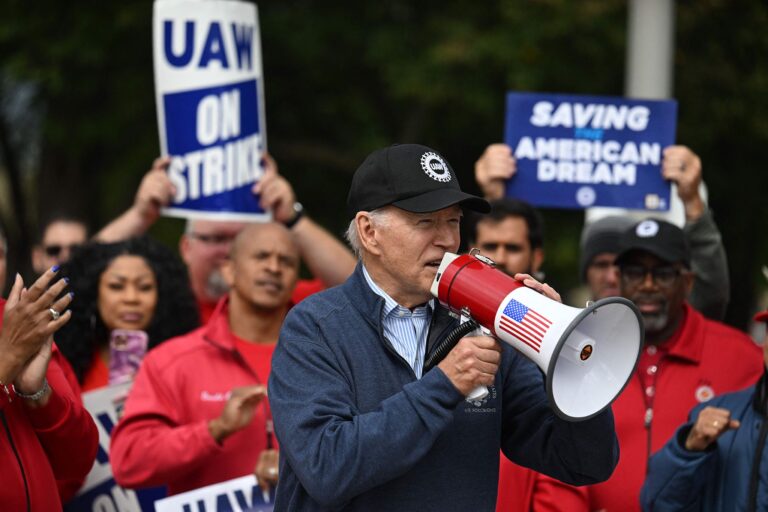
JJ Zeng is a student at Harvard Law School and a member of the Labor and Employment Lab.
What would you do for a chance at FIVE MILLION DOLLARS? Mr. Beast wants to know.
Mr. Beast is a YouTuber known for his extravagant stunt videos and philanthropy, often promising extreme rewards for the completion of outrageous tasks. Since rising to prominence in 2017, he has grown the largest YouTube following of any content creator, with over 381 million subscribers. He makes money by spending money, sometimes giving away millions of dollars in videos bankrolled by corporate sponsorships. These provocative videos, like “Face Your Biggest Fear to Win $800,000” and “Survive 100 Days in Nuclear Bunker, Win $500,000,” invariably ask a central question: what would you be willing to do for this much money?
Beast Games is his new reality TV show on Amazon Prime Video, a 10-episode game show where 1,000 people vie for a chance at winning $5 million. It’s Squid Games, bastardized—an American Dream, refreshed for an American audience.
Episode 1. Mr. Beast is standing on a stack of cash and dropping screaming, eliminated competitors through actual trapdoors in the floor.
Gruesome? Yes. Mesmerizing? Also, yes. Yet underlying the garish aesthetics and the projection of monumental wealth, is a fascinating expression of labor management relations. Because Beast Games isn’t just any other game show. Beast Games is the ultimate manifestation of corporate power, headed by one supreme quasi-oligarch-cum-billionaire-cum-corporate-manager, Mr. Beast himself.
In Beast Games, Mr. Beast uses his economic power to manipulate the working class. In the first episode, he eliminates the first 500 contestants through a combination of strategic bribes and induced betrayal. The contestants are arranged in a grid-like formation, in rows and columns. Mr. Beast announces that each row of 80 contestants will be a team “working together.” But for each team to move on, one person must voluntarily sacrifice themselves, losing their shot at the prize package and walking away with nothing. The last three rows to do so would be eliminated in their entirety. Immediately, the contestants begin shouting at each other from across the room. “I’m not stepping out!” one screams. “Please, please, can someone else please step out?”
But contestants were given no true opportunity for persuasion. Constrained by the grid-like arrangement and besieged by the urgency of a time limit, no contestant could communicate any views or common interests. In labor terms, this is a problem. See, e.g., Excelsior Underwear, Inc., 156 N.L.R.B. 1236 (1966) (recognizing that free choice under the NLRA requires free flow of information). Without any possibility for communication, there is no possibility for concerted action.
Labor unions supersede the needs of some individuals for the interests of the group, given the proposition that the group, working in concert, stands stronger together and thus may sustain a common benefit. In Beast Games, the group works only toward an opportunity to seize the ultimate benefit for oneself. The conceit of the show prohibits mutual benefit, which is the necessary fuel for any possibility of class solidarity.
In a subsequent game, Mr. Beast arranges the contestants into teams by columns, and offers a $20,000 bribe to any contestant willing to eliminate their team. The bribe gets bigger the longer the game goes on. What made them do it? Mr. Beast asks the contestants who took the bribe. “I didn’t trust my teammates,” they respond. Another says, “It was either you or me.”
Beast Games never fails to remind us that the point of Beast Games is zero-sum. Again and again, contestants are coerced into exploiting each other. In Episode 2, four contestants are given the opportunity to accept a $1 million bribe if they eliminate their team of 100. In Episode 3, two contestants brutally manipulate a third contestant into sacrificing herself after they are locked in a box and told only two can leave. In Episode 7, one contestant takes on the trolley problem and must choose between a new Lamborghini and three other contestants. For that scene, Mr. Beast rams an actual train through body doubles so contestants can almost literally watch themselves be crushed. That those three contestants happened to be all black women was not lost on the group. “It’s the microcosm of America: the black woman is always last,” proclaims one.
If Beast Games teaches us anything about these contestants’ baser instincts, though, it is only to the extent that they’ve been put into unsavoury positions by people with the power to do so in the first place. Yes, that’s Mr. Beast, enjoyingsituations of scarcity that he manufactured. But that’s also employment conditions in the United States, where employers are guaranteed ultimate authority over their employees, at least in part due to the at-will rule.
Contestants came to Beast Games because they saw it as an opportunity. Some wanted the money to “retire my dad,” or “completely get[] my whole family out of the poverty pipeline,” or escape homelessness. Others wanted “passive income for the rest of my life,” or “jet skis and gold chains.” “I will die for this,” promised one contestant. “I will die for $5,000,000!” There’s something to be said about a populace so desperate to bet on such terrible odds.
Beast Games is not simply a metaphor for employment; it is employment. OnLabor has previously written on the NLRB reclassification of Love is Blind participants as employees with access to greater labor protections.
As an employer, Mr. Beast is responsible for the working conditions of his employees. Yet accusations of difficult and unsafe conditions for both the production crew and the contestants have plagued the set of Beast Games since August. Crew members described grueling 80-hour, 7-day weeks, in a working environment “loose with safety” to keep up with production demands. A crew member was injured so badly on set in Canada that he was unable to work for several months. Last September, five anonymous participants in Beast Games sued Mr. Beast in a class action lawsuit, alleging failure to pay minimum wage and overtime, false advertising, and sexual harassment, amongst other claims.
Either we can accept that these contestants chose to join Beast Games, assumed the risks, and must be owed nothing. Or we can commit to a labor-sympathetic framework and recognize that there is no semblance of “free choice” in a context of inherently unequal bargaining power—because when Mr. Beast dangles gigantic proverbial carrots in front of economically vulnerable contestants, what happens next is obvious.










Daily News & Commentary
Start your day with our roundup of the latest labor developments. See all
February 20
An analysis of the Board's decisions since regaining a quorum; 5th Circuit dissent criticizes Wright Line, Thryv.
February 19
Union membership increases slightly; Washington farmworker bill fails to make it out of committee; and unions in Argentina are on strike protesting President Milei’s labor reform bill.
February 18
A ruling against forced labor in CO prisons; business coalition lacks standing to challenge captive audience ban; labor unions to participate in rent strike in MN
February 17
San Francisco teachers’ strike ends; EEOC releases new guidance on telework; NFL must litigate discrimination and retaliation claims.
February 16
BLS releases jobs data; ILO hosts conference on child labor.
February 15
The Office of Personnel Management directs federal agencies to terminate their collective bargaining agreements, and Indian farmworkers engage in a one-day strike to protest a trade deal with the United States.